If there’s one thing that can instantly elevate your cooking game, it’s finding the right potato. Whether you’re whipping up creamy mashed potatoes, roasting a batch to golden perfection, or looking for a hearty addition to soups and stews, Yukon Gold potatoes have probably made their way onto your radar. But why are they considered the ultimate all-purpose potato? Let’s dig into the history, benefits, and countless ways to use these golden beauties in your kitchen.
What Are Yukon Gold Potatoes?
Yukon Gold potatoes are renowned for their golden-yellow flesh and thin, smooth skin. Unlike starchy varieties like Russets, they offer a perfect balance of creamy texture and rich flavor, making them a versatile choice in the kitchen. Whether you’re preparing a 4-ingredient potato soup or crafting an elegant potato gratin, these potatoes elevate any dish they touch.
The Origin and History
Yukon Gold potatoes didn’t just appear out of nowhere. They were developed in Canada during the 1960s and officially released to the public in 1980. The team behind this innovation, including a Dutch-born scientist named Gary Johnston, was on a mission to create a potato that could handle it all—boiling, baking, frying, and even mashing. The name “Yukon” pays homage to the Yukon River, and “Gold” reflects its rich, golden color.
Interestingly, these potatoes were a response to the growing demand for a potato that wasn’t just functional but also visually appealing. Their buttery yellow hue and creamy texture quickly made them a favorite among both home cooks and professional chefs.
How Yukon Gold Potatoes Got Their Name
The story behind the name is as delightful as the potatoes themselves. Johnston and his team wanted a name that symbolized both the potato’s Canadian roots and its golden-yellow flesh. By combining the “Yukon” region, known for its gold rush, with the word “Gold,” they created a name that perfectly encapsulates the potato’s unique qualities.
Are Yellow Potatoes and Yukon Gold Potatoes the Same?
This is a common question, and the short answer is no, not all yellow potatoes are Yukon Golds. While Yukon Golds fall under the category of yellow potatoes, not every yellow potato is a Yukon Gold. Think of it like comparing Champagne to sparkling wine. Yukon Golds have a unique combination of flavor, texture, and versatility that sets them apart. Their skin is thinner, their flesh is creamier, and their taste is subtly sweet and buttery—a trio that’s hard to beat.
Nutritional Value of Yukon Gold Potatoes
When it comes to nutrition, Yukon Gold potatoes offer far more than just empty calories. Packed with essential vitamins and minerals, they’re a nutrient-dense addition to any meal.
Calories, Vitamins, and Minerals
One medium Yukon Gold potato (about 150 grams) contains approximately 110 calories, making it a guilt-free choice for most diets. They’re rich in vitamin C, which boosts your immune system, and potassium, which helps regulate blood pressure. Additionally, they contain small amounts of iron, magnesium, and B vitamins, all of which are essential for maintaining energy and overall health.
Health Benefits of Eating Yukon Gold Potatoes
Beyond their creamy taste, Yukon Gold potatoes offer numerous health benefits. They’re rich in potassium, which supports heart health, and provide moderate fiber for digestion. Their nutrient profile makes them a guilt-free ingredient for hearty meals like chicken tacos. For an added twist, pair them with a flavorful chicken taco seasoning recipe to create a balanced and satisfying dish.
Comparing Yukon Gold Potatoes to Other Potato Varieties
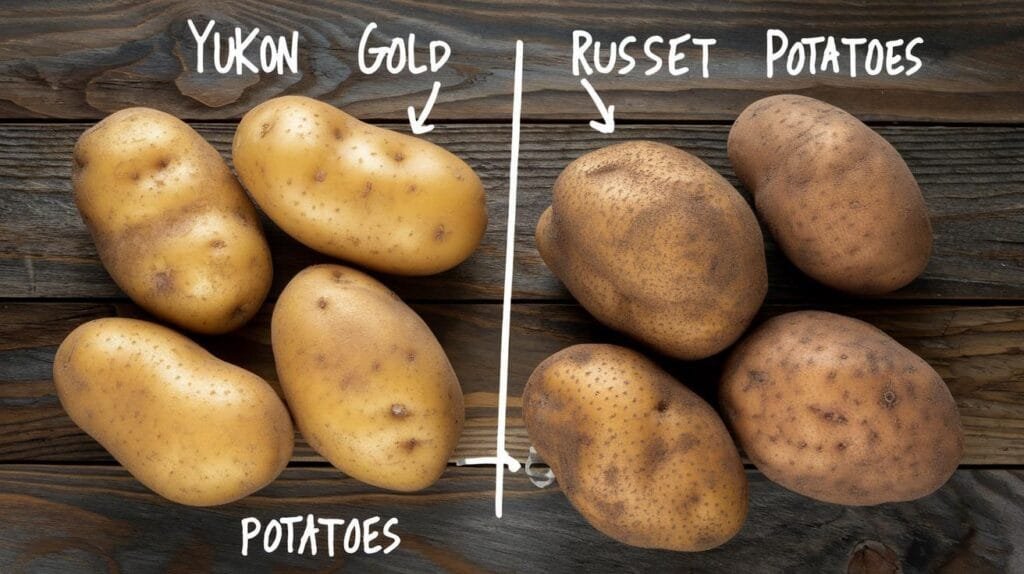
Not all potatoes are created equal, and Yukon Golds are proof of that. Compared to Russet potatoes, they have less starch and more moisture, giving them a creamy texture when cooked. While Russets are best for baking and frying, Yukon Golds shine in recipes that call for a versatile, all-purpose potato.
What Makes Yukon Gold Potatoes Special?
Yukon Gold potatoes are more than just another variety on the grocery store shelf—they’re a game-changer in the kitchen.
Taste, Texture, and Versatility
Imagine biting into a potato that’s perfectly creamy, slightly sweet, and has just the right amount of starchiness. That’s exactly what you get with Yukon Golds. Their thin skin makes peeling optional, and their texture holds up well in almost any cooking method, from boiling to roasting.
Why Chefs and Home Cooks Prefer Yukon Gold Potatoes
Chefs and home cooks alike praise Yukon Gold potatoes for their consistency and versatility. Whether you’re whipping up a velvety potato soup or roasting crispy wedges, their natural buttery flavor eliminates the need for heavy cream or butter. For a sweet complement to your meal, consider serving them with a homemade long john donut as a dessert option.
How They Differ From Russet Potatoes
Russet potatoes are starchy and dry, which makes them ideal for crispy fries or fluffy baked potatoes. On the other hand, Yukon Golds are waxy and moist, making them better suited for creamy mashed potatoes or roasted dishes. If Russets are the workhorse of the potato world, Yukon Golds are the sophisticated all-rounder.
Cooking with Yukon Gold Potatoes
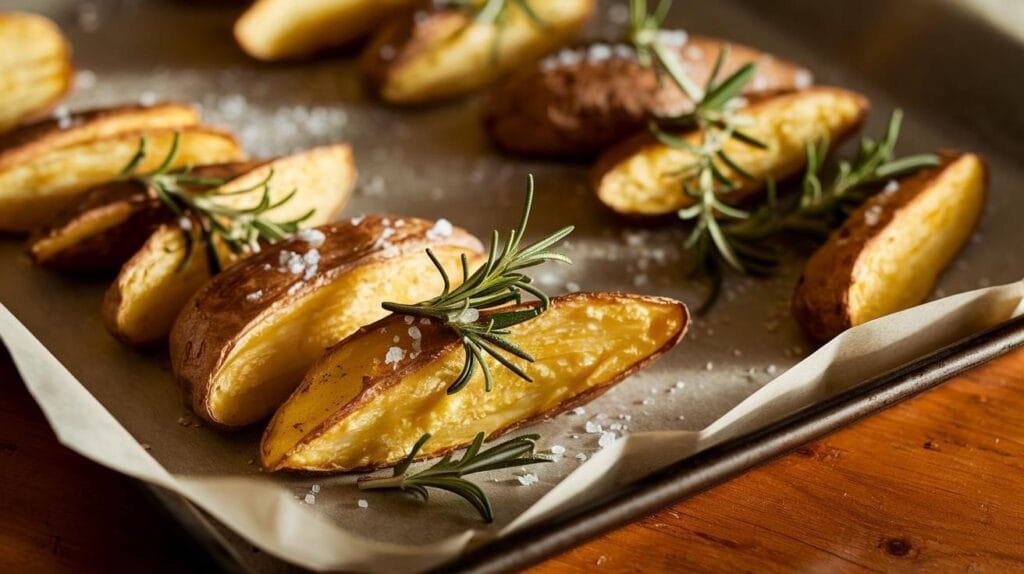
Yukon Gold potatoes shine in a variety of recipes, from creamy mashed potatoes to golden roasted wedges. Their versatility makes them the ideal foundation for creative dishes. Try pairing them with savory cured meats like soppressata, which balances their richness with a flavorful punch. Explore the tradition of soppressata and how to incorporate it into your meals.
Yukon Gold Potatoes Recipe Ideas
Looking for inspiration? Here are a few popular ways to cook Yukon Golds:
- Mashed Potatoes: Their natural creaminess makes them ideal for mashing. Add a touch of garlic or rosemary for extra flavor.
- Roasted Potatoes: Toss them in olive oil, sprinkle with sea salt, and roast until golden.
- Potato Salad: Their firm texture holds up beautifully in salads, especially when paired with a tangy vinaigrette.
How Long to Bake Whole Yukon Gold Potatoes?
Baking Yukon Gold potatoes is a breeze. Preheat your oven to 400°F (200°C), poke a few holes in the skin to release steam, and bake for about 45-50 minutes. The result? A perfectly fluffy interior and a slightly crispy skin.
Tips for Making Crispy Baby Yukon Gold Potatoes
Want to nail that restaurant-quality crispness? Here’s the trick: parboil the potatoes for about 10 minutes before roasting. Then, coat them in olive oil, season generously, and bake at a high temperature (425°F or 220°C). Flip them halfway through for even browning.
Where Are Yukon Gold Potatoes Grown?
When it comes to food, understanding where it’s grown often adds a deeper appreciation to what’s on your plate. Yukon Gold potatoes are no exception. Their origin story begins in Canada, but their popularity has spread worldwide, making them a staple in kitchens across the globe.
Canada: The Birthplace of Yukon Gold Potatoes
Yukon Gold potatoes were first cultivated in Ontario, Canada, at the University of Guelph. The Canadian climate, with its fertile soil and cool conditions, was the perfect environment for developing a hardy, versatile potato. The goal was to create a variety that would thrive not just in Canada but also in other parts of the world, where yellow-fleshed potatoes were already popular.
Even today, Canada is one of the leading producers of Yukon Golds. If you’ve ever wondered why these potatoes are often associated with high quality, it’s because Canadian farmers have perfected the art of growing them.
Other Regions Producing Yukon Gold Potatoes
Although their roots (pun intended) are in Canada, Yukon Gold potatoes are now grown in many countries, including the United States, the Netherlands, and even parts of South America. Idaho and Washington, known for their potato production, have embraced Yukon Golds due to their versatility and widespread demand.
The global cultivation of Yukon Gold potatoes is a testament to their adaptability. They can grow in a variety of climates and soils, making them accessible to farmers and consumers alike.
Common Problems and Solutions
Even the most beloved potatoes come with their share of challenges. If you’ve ever encountered issues with Yukon Gold potatoes, don’t worry—they’re all fixable with the right tips and tricks.
What Happened to Yukon Gold Potatoes in Some Stores?
Have you ever gone to your local store, only to find that are mysteriously missing from the shelves? This isn’t uncommon. Supply chain disruptions, seasonal shortages, and high demand can all lead to temporary unavailability.
But don’t despair! If you can’t find them, try checking at local farmers’ markets or specialty grocery stores. Better yet, consider growing your own if you have a green thumb—Yukon Golds are relatively easy to cultivate at home.
Best Substitute for Yukon Gold Potatoes When Unavailable
No Yukon Golds? No problem! There are several substitutes that can mimic their creamy texture and buttery flavor. Some of the best options include:
- Yellow Potatoes: These are the closest in taste and texture to Yukon Golds.
- Red Potatoes: While slightly waxier, they work well in similar recipes.
- White Potatoes: These can be a decent substitute, especially in mashed or baked dishes.
If you’re making a specific recipe, consider the texture you need—waxy potatoes like reds work better for salads, while starchy varieties like Russets are better for fries.
Proper Storage to Extend Shelf Life
Storing potatoes might seem straightforward, but a little extra care can go a long way in keeping your Yukon Golds fresh. Here’s what you need to know:
- Cool and Dark Place: Store your potatoes in a cool, dark, and well-ventilated area. Avoid refrigeration, as it can alter the flavor and texture.
- Avoid Moisture: Potatoes don’t like humidity. Keep them dry to prevent rotting.
- Separate From Other Produce: Potatoes release gases that can cause nearby fruits and vegetables to spoil faster, so keep them separate.
By following these tips, you can extend the shelf life of your Yukon Golds and avoid waste.
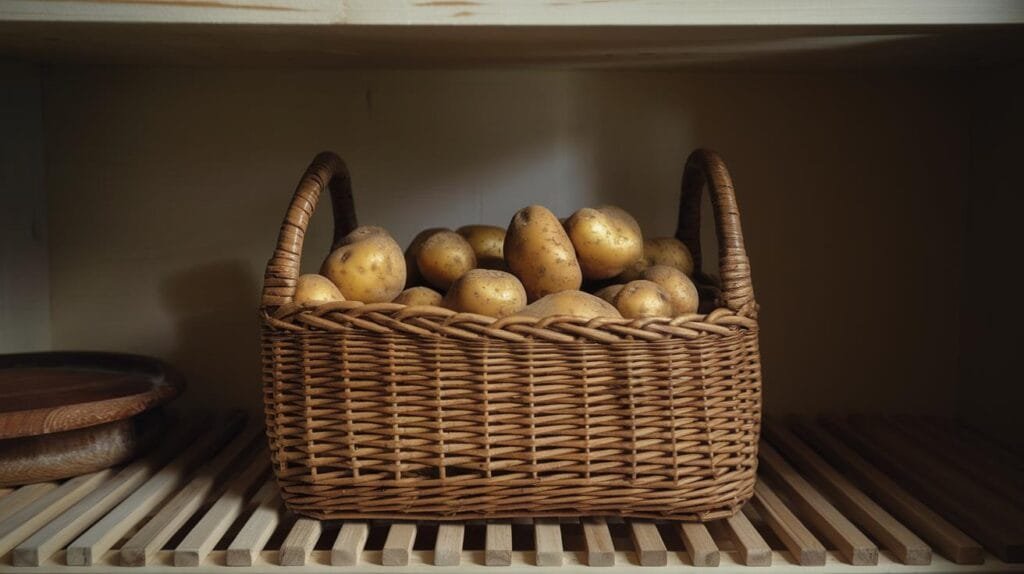
A Classic Favorite
Mashed potatoes are a comfort food staple, and Yukon Golds elevate this dish to a whole new level. Their naturally creamy texture means you can use less butter and cream while still achieving a luxurious consistency.
Here’s a simple recipe to try:
- Peel and boil Yukon Golds until tender.
- Mash them with a potato masher or ricer.
- Stir in a splash of warm milk, a pat of butter, and salt to taste.
- For extra flavor, add garlic, chives, or parmesan cheese.
The result? A dish that’s so creamy and flavorful, it’s sure to be a crowd-pleaser.
The Perfect Side Dish
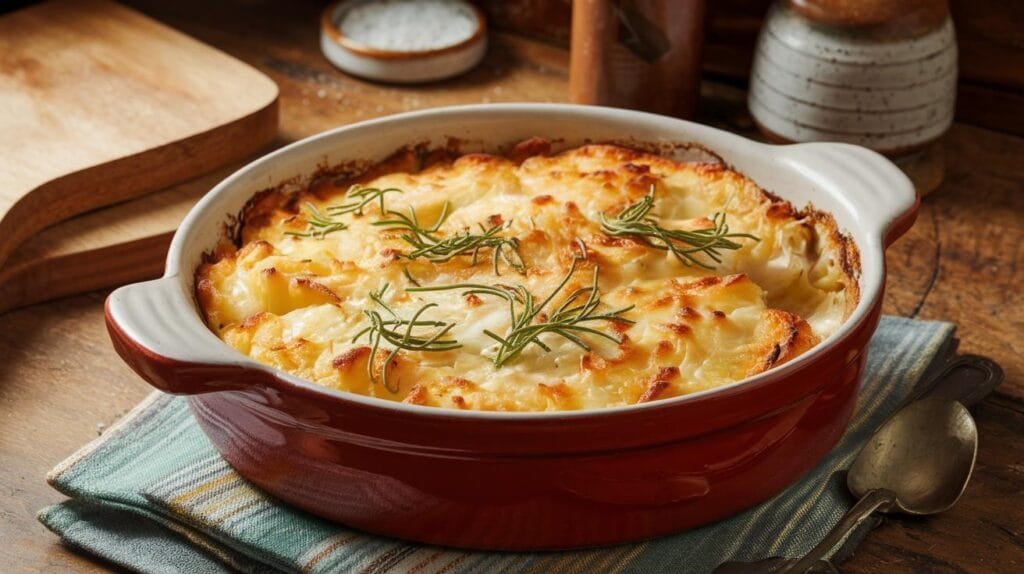
When it comes to creative dishes, Yukon Gold potatoes are a blank canvas. Imagine combining their creamy texture with a crispy coating for a delectable side dish. Toss them with olive oil, herbs, and spices, and roast to perfection. Pair these golden gems with a comforting fried chicken recipe to bring warmth to your table. Try this authentic crown fried chicken recipe to complete your meal.. Why not try something new? Here are a few ideas:
- Potato Gratin: Layer thinly sliced Yukon Golds with cream, cheese, and garlic for a rich and indulgent side dish.
- Potato Pancakes: Grate them, mix with egg and flour, and fry them up for a crispy treat.
- Potato Soup: Puree Yukon Golds with broth, onions, and cream for a velvety smooth soup.
The possibilities are endless, so don’t be afraid to experiment!
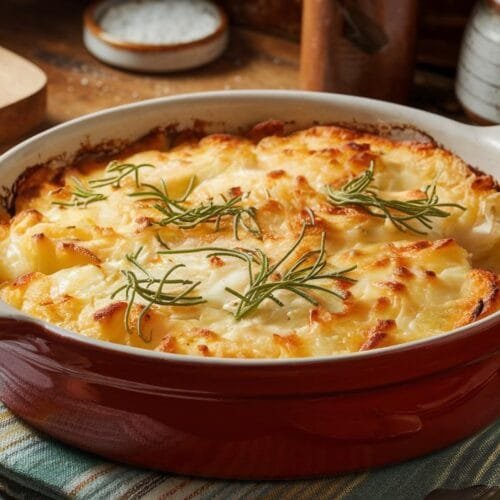
Yukon Gold Potatoes: The Perfect All-Purpose Potato
Ingredients
- - 2 lbs Yukon Gold potatoes thinly sliced
- - 2 cups heavy cream
- - 1 cup grated Gruyère cheese
- - 1 cup grated Parmesan cheese
- - 2 cloves garlic minced
- - 1 tsp salt
- - 1/2 tsp black pepper
- - 2 sprigs fresh rosemary optional, for garnish
Instructions
- 1. Preheat oven to 375°F (190°C).
- 2. Grease a 9x13-inch baking dish with butter or oil.
- 3. In a saucepan, heat heavy cream with minced garlic, salt, and pepper over medium heat until warm but not boiling.
- 4. Layer half of the potato slices in the baking dish. Pour half of the cream mixture over them.
- 5. Sprinkle half of the Gruyère and Parmesan cheeses over the potatoes.
- 6. Add the remaining potato slices, pour the remaining cream mixture, and top with the rest of the cheeses.
- 7. Cover the dish with foil and bake for 30 minutes.
- 8. Remove the foil and bake for another 20–25 minutes, or until the top is golden and bubbly.
- 9. Garnish with fresh rosemary if desired. Serve warm.
Notes
- Yukon Gold potatoes are recommended for their buttery flavor and creamy texture, but other potatoes can be used as a substitute.
- Leftovers can be stored in the refrigerator for up to 3 days.
Substitute and Similar Varieties
While Yukon Golds are unique, sometimes you need an alternative. Thankfully, there are several potatoes out there that can stand in for them when necessary.
What Type of Potato Is Similar to Yukon Gold?
If you can’t find Yukon Golds, try these alternatives:
- Kennebec Potatoes: These have a similar texture and mild flavor.
- Fingerling Potatoes: Their buttery taste makes them a great substitute in certain recipes.
- Dutch Yellow Potatoes: These are often mistaken for Yukon Golds due to their similar appearance and texture.
Each of these options has its own unique qualities, but they can all mimic the versatility of Yukon Golds in the right dish.
FAQs
By now, you’ve probably fallen in love with Yukon Gold potatoes (who wouldn’t, right?), but there are still a few common questions people have about these golden gems. Let’s tackle them head-on!
Are yellow potatoes and Yukon Gold potatoes the same?
Not exactly. While all Yukon Golds are yellow potatoes, not all yellow potatoes are Yukon Golds. Yukon Golds are a specific variety with a perfect balance of waxy and starchy characteristics. They also have a buttery flavor and a smooth, thin skin that sets them apart. Other yellow potatoes might be waxier or less flavorful, but they can work as a substitute if needed.
What is special about Yukon Gold potatoes?
What isn’t special about them? Yukon Gold potatoes are prized for their versatility, creamy texture, and rich, buttery flavor. They’re the ultimate all-purpose potato, ideal for everything from mashed potatoes to potato salads, roasted dishes, and soups. Their thin skin doesn’t require peeling (unless you want to), and they hold their shape beautifully, even after cooking.
What is the difference between Russet potatoes and Yukon Gold potatoes?
This is a popular question, and for good reason! Russet potatoes and Yukon Golds are like apples and oranges—they’re both potatoes, but they serve different purposes in the kitchen.
- Russet Potatoes: High in starch, dry, and fluffy when cooked. Perfect for baking, frying, and making crispy dishes like French fries.
- Yukon Gold Potatoes: Medium starch with a creamier texture and slightly waxy consistency. Better for mashing, roasting, and dishes where you want a smooth texture.
What type of potato is similar to Yukon Gold?
If you’re hunting for a Yukon Gold alternative, look for yellow-fleshed varieties like Dutch Yellow or Yellow Finn potatoes. These share a similar texture and buttery taste. Fingerlings can also be a good substitute, especially for roasting or boiling.
Conclusion
There’s a reason Yukon Gold potatoes are celebrated as the perfect all-purpose potato. Their creamy texture, buttery flavor, and incredible versatility make them a staple for everything from weeknight dinners to holiday feasts. Whether you’re making classic mashed potatoes, crispy roasted wedges, or an indulgent potato gratin, Yukon Golds deliver every time.
But it’s not just about their taste and texture. These potatoes are packed with nutrients, making them a healthy addition to your diet. Plus, their Canadian heritage and global popularity add a layer of charm that makes them even more enjoyable to cook with.
So, the next time you’re standing in the produce aisle, skip the Russets and grab some Yukon Golds. Your taste buds (and your dinner guests) will thank you!

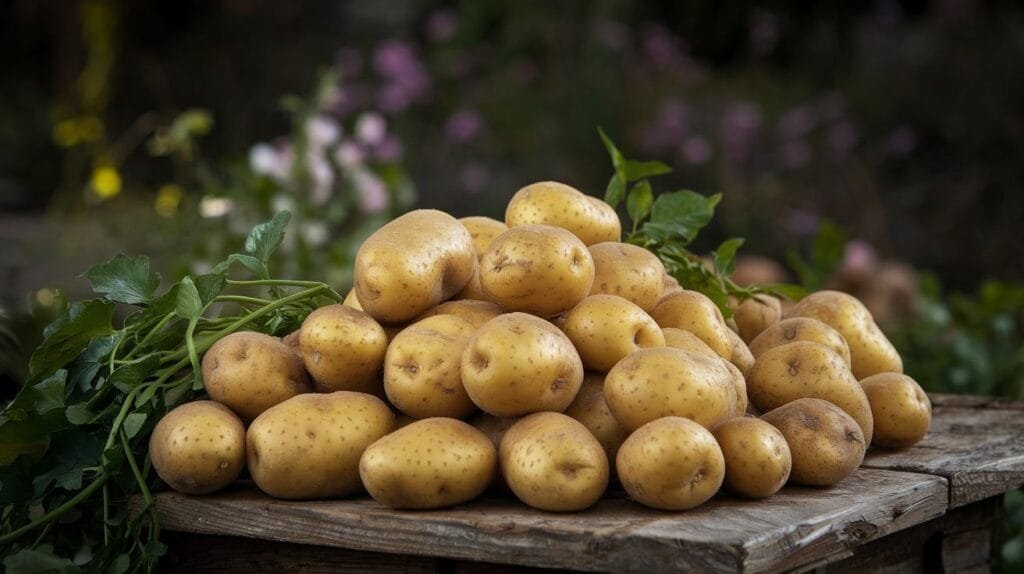
Verry Helpful ! thank you